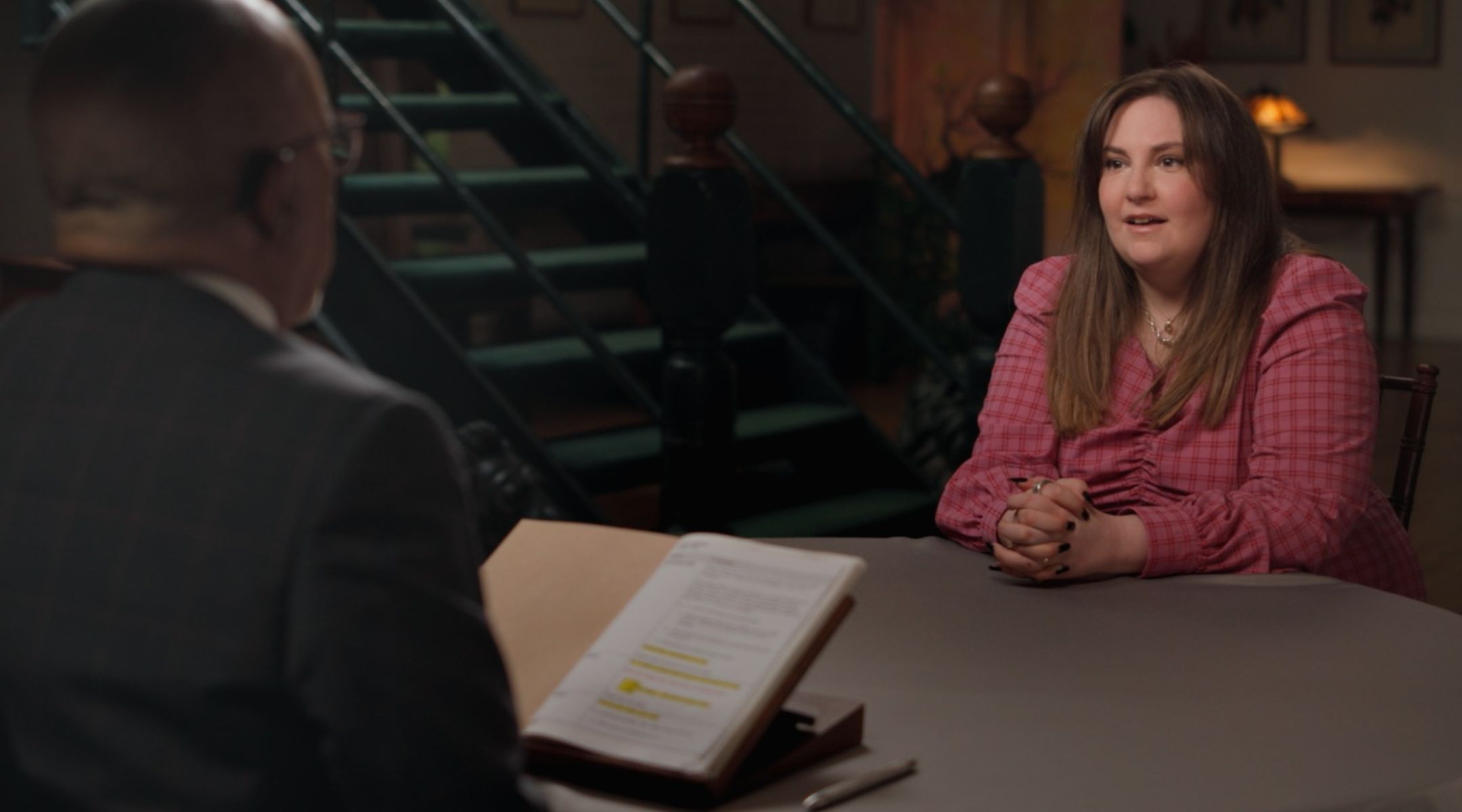Jewish comedian Lena Dunham discovers her family’s Holocaust story on PBS’ ‘Finding Your Roots’
Dunham’s great-great-grandmother Regina came to America as a teenager but left behind at least 11 siblings in Europe

Lena Dunham appears on PBS’s genealogy series “Finding Your Roots.” (Courtesy of PBS)
(JTA) — Jewish actress and writer Lena Dunham is the latest Hollywood star to discover that her family has ties to the Holocaust on the PBS celebrity genealogy series “Finding Your Roots.”
Dunham, the sometimes controversial comedian who was born to a Protestant father and a Jewish mother, has previously described herself as “very culturally Jewish,” and she stars in a forthcoming film, “Treasure,” that features a family grappling with its Holocaust history. But until taping the “Finding Your Roots” episode that airs next week, she did not know that she herself had family members who survived the Holocaust — and at least one who did not.
Host and Harvard University history professor Henry Louis Gates Jr. shares the story of Dunham’s great-great-grandmother Regina, who came to America as a teenager but left behind at least 11 siblings in Europe. One of Regina’s brothers, Moses, moved with his family to Hungary around the time that World War II began.
Moses’ family was separated, and his daughter Ilona was sent to Kamianets-Podilskyi, a city now in western Ukraine that had been under Nazi control. Over the course of two days in August 1941, an estimated 24,000 Jews there were murdered, likely including Ilona. The names of Moses, along with his wife and son, would later appear on a list of living Hungarian Jews compiled by Allied soldiers at the end of the war. But Ilona was not found on that document, nor on any other postwar record.
“It’s an amazing thing to see those names, and to know that they’re a part of our family,” Dunham said. “But to also know that they had to spend the rest of their lives with this other person — who was so important to them — missing, and wondering about her fate, must have made surviving a very complicated thing.”
“What’s it like to even begin to contemplate that you have a genetic connection now to the Holocaust, of which you weren’t aware?” Gates asks Dunham.
She replies: “It’s an incredibly painful thing to think about people with whom I share probably not just DNA, but features and emotional responses and an approach to life — those people being placed in this situation and having their lives extinguished this way, there’s not a way to reckon with it. It’s too big and the whole act is too vast, but to see a personal connection to it literalizes it in a way that’s very, very powerful.”
Dunham is best known for the HBO series “Girls,” which she created, wrote and starred in, and for which she earned six Emmy nominations and two Golden Globes. Dunham is the first woman to win the Directors Guild of America’s comedy directing award, also for “Girls.” She was included in Time magazine’s 2013 list of the world’s 100 most influential people.
Dunham appears on Tuesday’s episode alongside Jewish actor Michael Douglas, the two-time Oscar winner.
Douglas’s father Kirk, also a renowned actor, had his own well known Jewish story, but the younger Douglas did not know much about his grandfather’s family. “Finding Your Roots” researchers discovered his great-uncle’s name on the passenger list of a ship that arrived in New York in April 1911, and Douglas learned that part of his family came to America from the Russian village of Chausy — after a run-in with the law.
Gates also shared with Douglas that his team had identified an 18th-century Jewish cemetery in Belarus where some of his ancestors had likely been buried.
“I feel more of a spiritual, religious connection to Judaism than I ever had before,” Douglas said as he processed his family’s newfound story. He also said he wished he could share this new information with his father, who died in 2020 at 103.
The PBS series has previously uncovered the Jewish histories of rock star Alanis Morissette, who also discovered her family’s Holocaust history, as well as Pamela Adlon, Dustin Hoffman and others.
This article originally appeared on JTA.org.
A message from our CEO & publisher Rachel Fishman Feddersen
I hope you appreciated this article. Before you go, I’d like to ask you to please support the Forward’s award-winning, nonprofit journalism during this critical time.
We’ve set a goal to raise $260,000 by December 31. That’s an ambitious goal, but one that will give us the resources we need to invest in the high quality news, opinion, analysis and cultural coverage that isn’t available anywhere else.
If you feel inspired to make an impact, now is the time to give something back. Join us as a member at your most generous level.
— Rachel Fishman Feddersen, Publisher and CEO